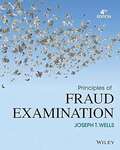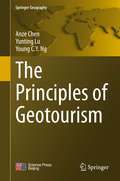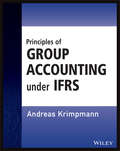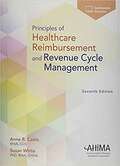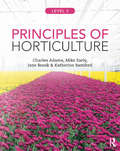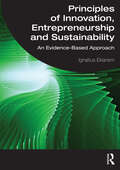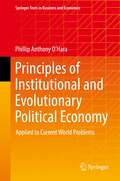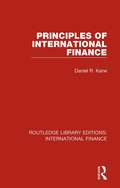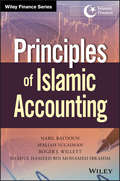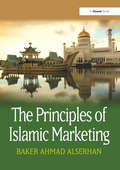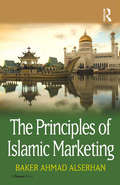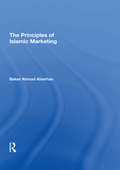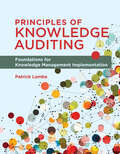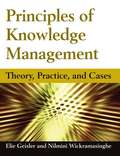- Table View
- List View
Principles of Food Science
by Janet D. Ward Larry T. WardPrinciples of Food Science is designed to help you learn about the relationships among science, food, and nutrition. Basic laws of chemistry, microbiology, and physics are applied to the production, processing, preservation, and packaging of food. You will explore the characteristics of each component found in food. You will examine the helpful and harmful effects of micro-organisms on the food supply.
Principles of Fraud Examination
by Joseph T. WellsPrinciples of Fraud Examination 4th Edition by Joe Wels contains engaging real-life case studies and an analysis of the complexity of frauds and fraudulent behavior incorporated throughout the book. This text provides a broad understanding of fraud—what it is and how it is committed, prevented, and resolved. Principles of Fraud Examination 4th Edition begins by providing an understanding of fraud examination methodology then documents the schemes used by executive, managers, and employees to commit fraud against their organizations. Case studies, complete with statistics and flowcharts, are provided for each chapter. <p><p>The primary focus of this text is maintained in the updated edition, with coverage of the actual accounting and human behaviors that lead to cases of accounting fraud. The 4th edition includes updates to reflect new and revised accounting standards and laws, updated statistics to include the most recent ACFE findings, and moderate changes to end of chapter material. Also included in the newest edition is updated coverage of recent examples of fraud accounting in the real world.
The Principles of Geotourism
by Anze Chen Yunting Lu Young C. Y. NgThe book introduces tourism earth-science as a new scientific discipline by applying the principles of earth-science in the study of natural and human tourism resources. It involves studying the geo-scientific characteristics of these tourism resources through surveys, evaluation and aesthetic value assessment. It also discusses about the principles behind geopark establishment and management. It is an important publication providing direction for geopark and tourism developments in China. The book is a tool for geological heritage survey, assessment and research. It can also be used to assist planning of geopark, national parks, heritage protection and scientific interpretation. It is a valuable teaching material for teachers and students of geoscience and tourism as well as providing useful guidance for geopark managers and tour guides in their operation. In addition, the book also offers scientific knowledge of the surrounding natural and cultural landscapes to the public and the general visitors.
Principles of Good Measurement
by Mark A. Huselid Brian E. Becker Dave UlrichThe performance-measurement system you use plays an important role in securing HR's credibility and determining its place in the firm. A sound measurement system improves HR's decision-making by focusing on aspects of the organization that create value, and provides a valid and systematic justification for the allocation of resources. This chapter focuses on thinking strategically about measurement, providing essential principles for developing and implementing a performance-measurement system that will support investment in HR as a strategic resource.
Principles of Group Accounting under IFRS
by Andreas KrimpmannA professional perspective to implementing IFRS 10, 11, and 12 The new International Financial Reporting Standards (IFRS) 10, 11, and 12 are changing group accounting for many businesses. As business becomes increasingly global, more and more firms will need to transition using the codes and techniques described in Principles of Group Accounting under IFRS. This book is a practical guide and reference to the standards related to consolidated financial statements, joint arrangements, and disclosure of interests. Fully illustrated with a step-by-step case study, Principles of Group Accounting under IFRS is equally valuable as an introductory text and as a reference for addressing specific issues that may arise in the process of consolidating group accounts. The new international standards will bring about significant changes in group reporting, and it is essential for accountants, auditors, and business leaders to understand their implications. Author Andreas Krimpmann is an internationally recognized authority on the transition from GAAP to IFRS, and this new text comes packaged with GAAP/IFRS comparison resources that will help make the changes clear. Other bonus resources include an Excel-based consolidation tool, checklists, and a companion website with the latest information. Learn about: Definitions, requirements, processes, and transition techniques for IFRS 10, 11, and 12 covering group level accounting Practical implementation strategies demonstrated through a clear case study of a midsize group Key concepts related to consolidated financial statements, joint ventures, management consolidation, and disclosure of interests Comparisons between GAAP and IFRS to clarify the required changes for international firms Whatever stage of the consolidation process you are in, you will appreciate the professional perspective in Principles of Group Accounting under IFRS.
Principles of Health and Safety at Work
by Allan St Holt Jim AllenThis is a reprint of ISBN 978-0-901-35743-4 Widely acknowledged as the one stop summary of health and safety fundamentals, Principles covers law, safety technology, occupational health and hygiene and safety management techniques. Originally written by the late international health and safety expert Allan St John Holt, this new edition has been comprehensively updated by Allan's colleague Jim Allen. The book is designed as a concise, accessible introduction to health and safety basics and includes revision notes and a wide range of references. It is a first class resource for NEBOSH Certificate students.
Principles of Healthcare Reimbursement
by Anne CastoPrinciples of Healthcare Reimbursement integrates information about all US healthcare payment systems into one authoritative resource. Boost your understanding of the complex financial systems in today's healthcare environment, including the basics of health insurance, public funding programs, managed care contracting, and how services are paid. Gain clear insight into how reimbursement systems have made an impace on providers and payers, consumers, public policy makers, and the development of classification and information technology systems over the years.
Principles of Healthcare Reimbursement
by Anne CastoPrinciples of Healthcare Reimbursement 7th Edition
Principles of Healthcare Reimbursement, Fifth Edition
by Elizabeth Forrestal Anne B. CastoThe fifth edition of Principles of Healthcare Reimbursement provides educators, students, and practitioners with up-to-date information on healthcare payment systems and their effects on the US healthcare delivery system and economy in one authoritative source.
Principles of Horticulture
by Charles Adams Jane Brook David Francis Mike EarlyGardening and horticulture generally are essentially practical activities much enhanced by an understanding of how plants grow. This colourful guide will introduce you to the fundamentals of horticulture. It is written in a clear and accessible style and covers the principles that underpin growing plants for the garden and allotment, with reference to how these are tackled by professionals.With highlighted definitions, key points and illustrations in full colour, this book will be a useful companion as you progress in the study and practice of horticulture. The book covers topics such as classifying and naming plants, the plant life cycle, ecology and garden wildlife, soils, composts, hydroponics, weeds, plant nutrition, plant pests, and plant diseases and disorders. The new edition has been updated to reflect changes in legislation and the modernization of horticultural practices. It is also fully reflective of the changes in the new syllabuses for horticulture at Level 2.Principles of Horticulture is a valuable resource whether you are taking a Level 2 RHS, City and Guilds, Teagasc or SNQ course, or are a keen amateur or seasoned gardener.The book is accompanied by ancillary materials including essential and extended information on horticultural principles and downloadable instructor resources.
Principles of Horticulture: Level 3
by Charles Adams Mike Early Jane Brook Katherine BamfordThis colourful guide will explain the fundamentals of growing plants, whether you are taking a Level 3 RHS, City and Guilds or Edexcel course, are a grower or gardener in the industry, or are just a keen amateur. Written in a clear and accessible style, this book covers the principles that underpin plant production, the use of growing media and crop protection, but with reference also to the same practices in the garden or allotment. With highlighted definitions, key points, and illustrated in full colour, this book will be a useful companion as you progress in the study and practice of horticulture. Complete with a companion website which includes extended horticultural information, questions and exercises to test your knowledge, syllabus cross-referencing and downloadable tutor and student support materials.
The Principles of Housing
by Peter KingThe Principles of Housing is an engaging and discursive introduction to the key topics within housing studies. Whereas many books get bogged down in country-specific policy or small innovations, this book argues that the fundamental concepts of what we call housing are relatively stable and unchangeable. By focusing on universal principles, the book provides an introduction to housing that can be used by students world-wide. The book consists of a series of short chapters relating to the key issues of housing, such as borrowing, choice, finance, government, need, reform and welfare. Each chapter is designed to be a starting point for a wider conversation, with discussion questions and a number of think pieces and international case studies to help students connect these general principles to their own surroundings. Written by renowned housing expert Peter King, The Principles of Housing succeeds in being accessible and engaging without shying away from the complexities of housing issues. The book will be invaluable to students on housing-related courses across finance, real estate, planning, development, politics and sociology subjects. The book would also be useful to housing professionals and policy makers aiming to expand their understanding of housing issues.
Principles of Housing Finance Reform
by Joseph Tracy Susan M. WachterIn the fall of 2008, the world watched in horror as the U.S. housing finance system shattered, triggering a global financial panic and ultimately the Great Recession. Now, nearly a decade later, the long and slow housing recovery has reached a critical moment. Though the housing finance system has stabilized, it remains in the hands of the federal government, leaving taxpayers exposed to the credit risk while private funding remains mostly on the sidelines.Principles of Housing Finance Reform identifies the changes necessary to modernize the housing finance system, identifying guiding principles that should underlie a rebuilt system. Contributors to the volume set out a wealth of innovative solutions that are possible within this framework, presenting proposals for long-term structural reforms that would infuse new life into the U.S. housing finance system while enhancing long-term stability.Nearly a decade after the inception of the Great Recession, reform proposals have arisen across the political spectrum. This is a moment of opportunity for rebuilding a key sector of the U.S. economy. The research in this volume represents the best thinking of policy researchers and economic experts on the challenges that lie ahead and provides a roadmap for reforms to create a system characterized by liquidity, stability, access, and sustainability.Contributors: W. Scott Frame, Meghan Grant, John Griffith, Diana Hancock, Stephanie Heller, Akash Kanojia, Patricia C. Mosser, Kevin A. Park, Wayne Passmore, Roberto G. Quercia, David Scharfstein, Phillip Swagel, Joseph Tracy, Susan M. Wachter, Dale A. Whitman, Mark A. Willis, Joshua Wright.
Principles of Innovation, Entrepreneurship and Sustainability: An Evidence-Based Approach
by Ignatius EkanemThis book presents the principles governing the entrepreneurial and innovation mindset and processes of people working in the small business sector and other organisations, based on research findings from real-life issues and challenges that face entrepreneurs on a daily basis. Entrepreneurship development forms the bedrock of business evolution and economic growth in many nations: indeed, without entrepreneurship, there can be no real economic development. This book provides students with an accessible introduction to innovation and entrepreneurship, examining the different forms of innovative and entrepreneurial practice including commercial and social enterprise. The book introduces some of the major business management issues faced by entrepreneurs and small business owners. It also introduces readers to such concepts as opportunity recognition and the ability to act upon opportunities and problem solving. Throughout, the book is founded on an evidence base drawn from the author's own years of teaching and research. An essential read for students of entrepreneurship and innovation at both undergraduate and postgraduate levels, Principles of Innovation, Entrepreneurship and Sustainability: An Evidence-Based Approach is an invaluable resource for anyone seeking to understand the realities of innovation and entrepreneurship in a more empirical context. Featuring a comprehensive range of case studies, reading lists, glossaries and discussion questions, this book provides students with all they need to develop their understanding of these exciting topics. The book is accompanied by digital learning resources including PowerPoint slides and test questions, complete with answers, for all chapters.
Principles of Institutional and Evolutionary Political Economy: Applied to Current World Problems (Springer Texts in Business and Economics)
by Phillip Anthony O’HaraThis is the very first book to explicitly both detail the core general principles of institutional and evolutionary political economy and also apply the principles to current world problems such as the coronavirus crisis, climate change, corruption, AI-Robotics, policy-governance, money and financial instability, terrorism, AIDS-HIV and the nurturance gap. No other book has ever detailed explicitly such core principles and concepts nor ever applied them explicitly to numerous current major problems. The core general principles and concepts in this book, which are outlined and detailed include historical specificity & evolution; hegemony & uneven development; circular & cumulative causation; heterogeneous groups & agents; contradiction & creative destruction; uncertainty; innovation; and policy & governance. This book details the nature of how these principles and concepts can be used to explain current critical issues and problems throughout the world. This book includes updated chapters that have won two journal research Article of the Year Awards on climate change (one from the European Association for Evolutionary Political Economy, EAEPE); as well as a Presidential address to the Association for Evolutionary Economics (AFEE) on corruption. The structure of the book starts with two chapters on the principles of institutional and evolutionary political economy: firstly their history, and secondly a chapter on the contemporary nature of the principles and concepts. This is followed by nine chapters applying some of the core principles to current world problems such as the coronacrisis, climate change, corruption, AI-robotics, policy, money & financial instability, terrorism, HIV-AIDS and the nurturance gap. The book finishes with a conclusion, a glossary of major terms and an index. The author’s principles are well established in the literature and this book provides a detailed exposition of them and their application.
Principles of Integrated Marketing Communications: An Evidence-based Approach
by Lawrence AngMarketing in the digital age poses major challenges for traditional and established practices of communication. To help readers meet these challenges Principles of Integrated Marketing Communications: An Evidence-based Approach provides a comprehensive foundation to the principles and practices of integrated marketing communications (IMC). It examines a variety of traditional and digital channels used by professionals to create wide-reaching and effective campaigns that are adapted for the aims of their organisations. This edition has been thoroughly revised and each chapter includes: case studies of significant and award-winning campaigns from both Australian and international brands that illustrate the application of explored concepts; discussion and case study questions that enable readers to critically evaluate concepts and campaigns; a managerial application section that illustrates how concepts can be applied effectively in a real situation; a 'further thinking' section that expands knowledge of advanced concepts and challenges readers to think more broadly about IMC.
Principles of Integrated Marketing Communications
by Lawrence AngPrinciples of Integrated Marketing Communications: A Focus on New Technologies and Advanced Theories explains the principles and practice of implementing an effective marketing strategy using a variety of channels and techniques, such as brand equity, advertising and personal selling. It equips students with the knowledge to develop sophisticated marketing campaigns for contemporary business environments. Designed to introduce students to IMC in an engaging way, this valuable resource covers the latest concepts and tools in marketing and communications - from theories of social influence to the growing use of social media. Each chapter contains a 'Further thinking' section, giving students the opportunity to extend their understanding of the conceptual and historical underpinnings of IMC and teaching them how to analyse and overcome problems when devising an IMC strategy. Each chapter also includes learning objectives and review questions, to reinforce knowledge. Extensive additional material - including extra case studies and topical multimedia files - is available on the companion website.
Principles of International Finance (Routledge Library Editions: International Finance #3)
by Daniel R. KanePrinciples of International Finance, first published in 1988, provides a comprehensive introduction to international finance which is rapidly becoming an increasingly important branch of international economics. The book is structured so that it can easily be adopted as a complete one-semester course in international finance and is divided into the four major divisions of international finance: The Foreign Exchange Market and the Balance of Payments; Exchange Rate Systems; Equilibrium and the Adjustment Process and The Post-War International Financial System. This book is designed for economics and business undergraduates studying international finance for the first time. It is non-mathematical and presumes no more than a general background in macroeconomics.
Principles of Islamic Accounting (Wiley Finance)
by Roger Willett Shahul Ibrahim Maliah Sulaiman Nabil BaydounYour introduction to Islamic accounting Principles of Islamic Accounting is the first and only text that covers the fundamentals of Islamic accounting in English. A comprehensive guide, this groundbreaking reference offers both insight into Islamic accounting best practices and disclosure for Shariah-compliant instruments. Covering everything from basic transaction analysis to the preparation of financial statements, this reference serves as a broad framework around which undergraduate students can build their understanding of the Islamic business environment by offering context and showcasing how Islamic values can influence the disclosure of financial information. Islamic accounting is becoming an increasingly important aspect of the business field as globalization results in a surge in business partnerships and transactions around the world. Today's students need to understand Islamic accounting principles in order to effectively work with professionals who adhere to these standards—and accessing this information via text in English was not possible until this revolutionary reference. Review the basics through an introduction to Islamic accounting Understand the recording process, and how to complete the accounting cycle and adjust accounts as necessary Explore accounting for assets, liabilities, equity, and sukuk, as well as zakat and takaful accounting Discover details regarding Islamic commercial law, accounting for Islamic financial institutions, and Islamic corporate governance and sustainability, and look at auditing from an Islamic perspective Principles of Islamic Accounting is an essential text for first-year university students who are studying Islamic accounting, as well as professional societies and organizations that support the use of Islamic accounting principles, such as The Islamic Finance Professionals Association.
The Principles of Islamic Marketing
by Baker Ahmad AlserhanThe Principles of Islamic Marketing fills a gap in international business literature covering the aspects and values of Islamic business thought. It provides a framework and practical perspectives for understanding and implementing the Islamic marketing code of conduct. It is not a religious book. The Islamic Economic System is a business model adopted by nearly one quarter of the world’s population. Baker Alserhan identifies the features of the Islamic structure of International Marketing practices and ethics. Adherence to such ethical practices elevates the standards of behaviour of traders and consumers alike and creates a value-loaded framework for meaningful cooperation between international marketers and their Muslim markets. His book provides a complete guide for an organization when managing its entire marketing function or when customising part of its offering to suit Muslim customers. It addresses the challenges facing marketers involved in business activities with and within Islamic communities, the knowledge needs of academic institutions, and the interest of multinationals keen on tapping the huge Islamic markets. Along the way, Baker Alserhan provides insights into key elements such as, distribution channels, retailing practices, branding, positioning, and pricing; all within the Muslim legal and cultural norms. This second edition brings the book up to date and features a number of new case studies and two additional chapters on Maqasid Al Shariah and the Islamic economy, and a strategic perspective on Islamic marketing and branding.
The Principles of Islamic Marketing
by Baker Ahmad AlserhanThe Principles of Islamic Marketing fills a gap in international business literature covering the aspects and values of Islamic business thought. It provides a framework and practical perspectives for understanding and implementing the Islamic marketing code of conduct. It is not a religious book. The Islamic Economic System is a business model adopted by nearly one quarter of the world’s population. Baker Alserhan identifies the features of the Islamic structure of International Marketing practices and ethics. Adherence to such ethical practices elevates the standards of behaviour of traders and consumers alike and creates a value-loaded framework for meaningful cooperation between international marketers and their Muslim markets. His book provides a complete guide for an organization when managing its entire marketing function or when customising part of its offering to suit Muslim customers. It addresses the challenges facing marketers involved in business activities with and within Islamic communities, the knowledge needs of academic institutions, and the interest of multinationals keen on tapping the huge Islamic markets. Along the way, Baker Alserhan provides insights into key elements such as, distribution channels, retailing practices, branding, positioning, and pricing; all within the Muslim legal and cultural norms. This second edition brings the book up to date and features a number of new case studies and two additional chapters on Maqasid Al Shariah and the Islamic economy, and a strategic perspective on Islamic marketing and branding.
The Principles of Islamic Marketing
by Baker Ahmad AlserhanThe Principles of Islamic Marketing fills a gap in international business literature covering the aspects and values of Islamic business thought. It provides a framework and practical perspectives for understanding and implementing the Islamic marketing code of conduct. It is not a religious book. The Islamic Economic System is a business model adopted by nearly one fifth of the world's population. Baker Alserhan identifies the features of the Islamic structure of International Marketing practices and ethics. Adherence to such ethical practices elevates the standards of behaviour of traders and consumers alike and creates a value-loaded framework for firms, establishing harmony and meaningful cooperation between international marketers and their Muslim target markets. His book provides a complete guide to the requirements an organization needs to follow when managing its entire marketing function within the Muslim market or when adapting part of its offering to that market. It addresses the challenges facing marketers involved in business activities with and within Islamic communities, the knowledge needs of academic institutions, and the interest of multinationals keen on tapping the huge Islamic markets. Along the way, Baker Alserhan provides insights into the various aspects of promoting to the Islamic markets such as franchising, distribution channels, and retailing practices, branding, positioning, and pricing issues; all within the Muslim legal and cultural norms. Above all, The Principles of Islamic Marketing will lay the foundation of, and advance, Islamic Marketing as a new social science.
Principles of Knowledge Auditing: Foundations for Knowledge Management Implementation
by Patrick LambeA comprehensive theoretical and practical guide to the operating principles of knowledge auditing, illustrated with numerous case studies.A knowledge audit provides an &“at a glance&” view of an organization's needs and opportunities. Its purpose is to improve an organization's effectiveness through a better understanding of the dynamics and levers of knowledge production, access, and use. However, this developing field is hampered by the lack of a common language about the origins and nature of knowledge auditing. In Principles of Knowledge Auditing, Patrick Lambe integrates the theory and practices of the field, laying out principles and guidelines for a clearer and more pragmatic approach to knowledge auditing that makes it more accessible to practitioners and researchers.Lambe examines knowledge auditing in the context of the development of communications, information, and knowledge management in the twentieth century. He critiques and clarifies ambiguities in how knowledge audits are approached and described, as well as how the results are conveyed within organizations. He discusses the benefits and risks of knowledge management standards. Knowledge auditors, he says, need a common frame of reference more than they need standards. Standards have their uses, but they provide only markers and sign posts and are poor representations of the richness of the landscape. He concludes with a set of guiding principles for practitioners.
Principles of Knowledge Management: Theory, Practice, and Cases
by Eliezer Geisler Nilmini WickramasingheThis text provides a comprehensive introduction to the new field of knowledge management. It approaches the subject from a management rather than a highly technical point of view, and provides students with a state-of-the-art survey of KM and its implementation in diverse organizations. The text covers the nature of knowledge (tacit and explicit), the origins and units of organizational knowledge, and the evolution of knowledge management in contemporary society. It explores the implementation and utilization of knowledge management systems, and how to measure their impact, outputs, and benefits. The book includes a variety of original case studies that illustrate specific situations in which the absence or existence of knowledge management systems has been crucial to the organization's actions. Charts and figures throughout help clarify more complex phenomena and classifications, and each chapter includes review questions and a comprehensive index.


